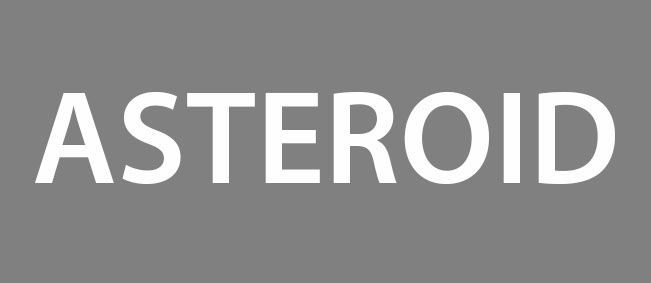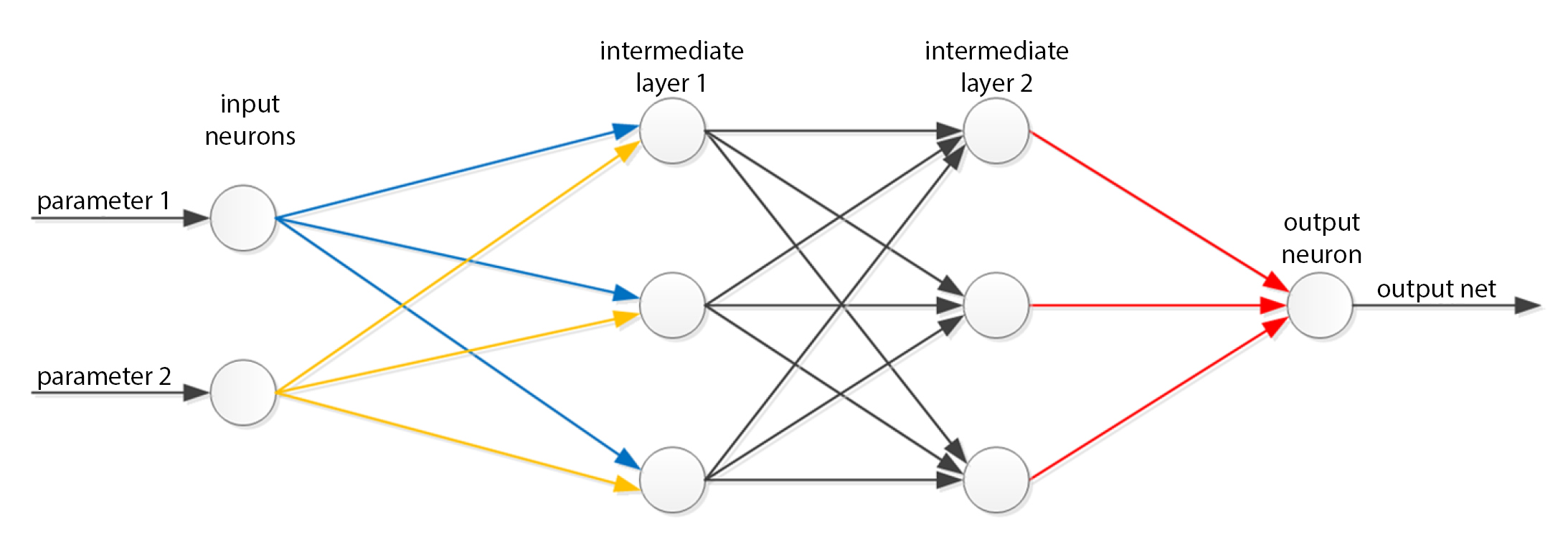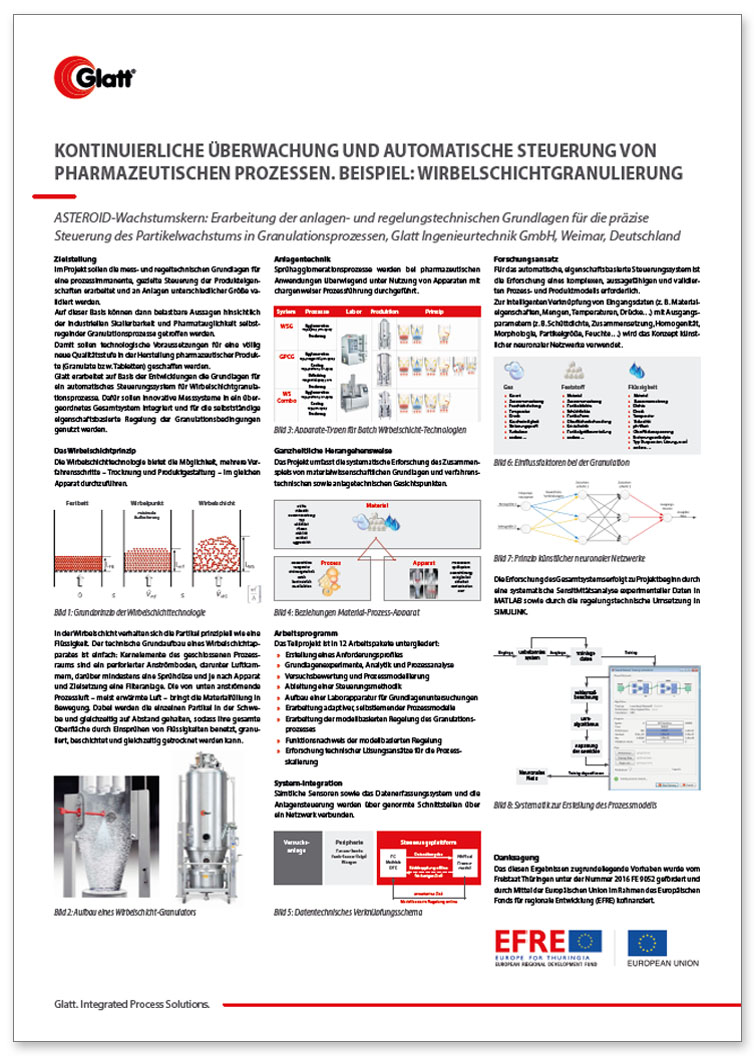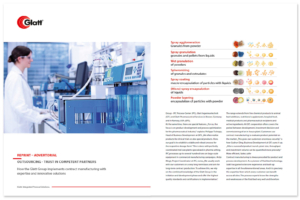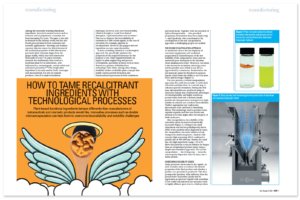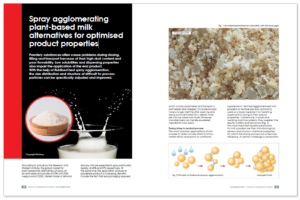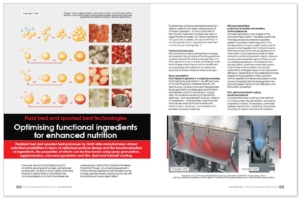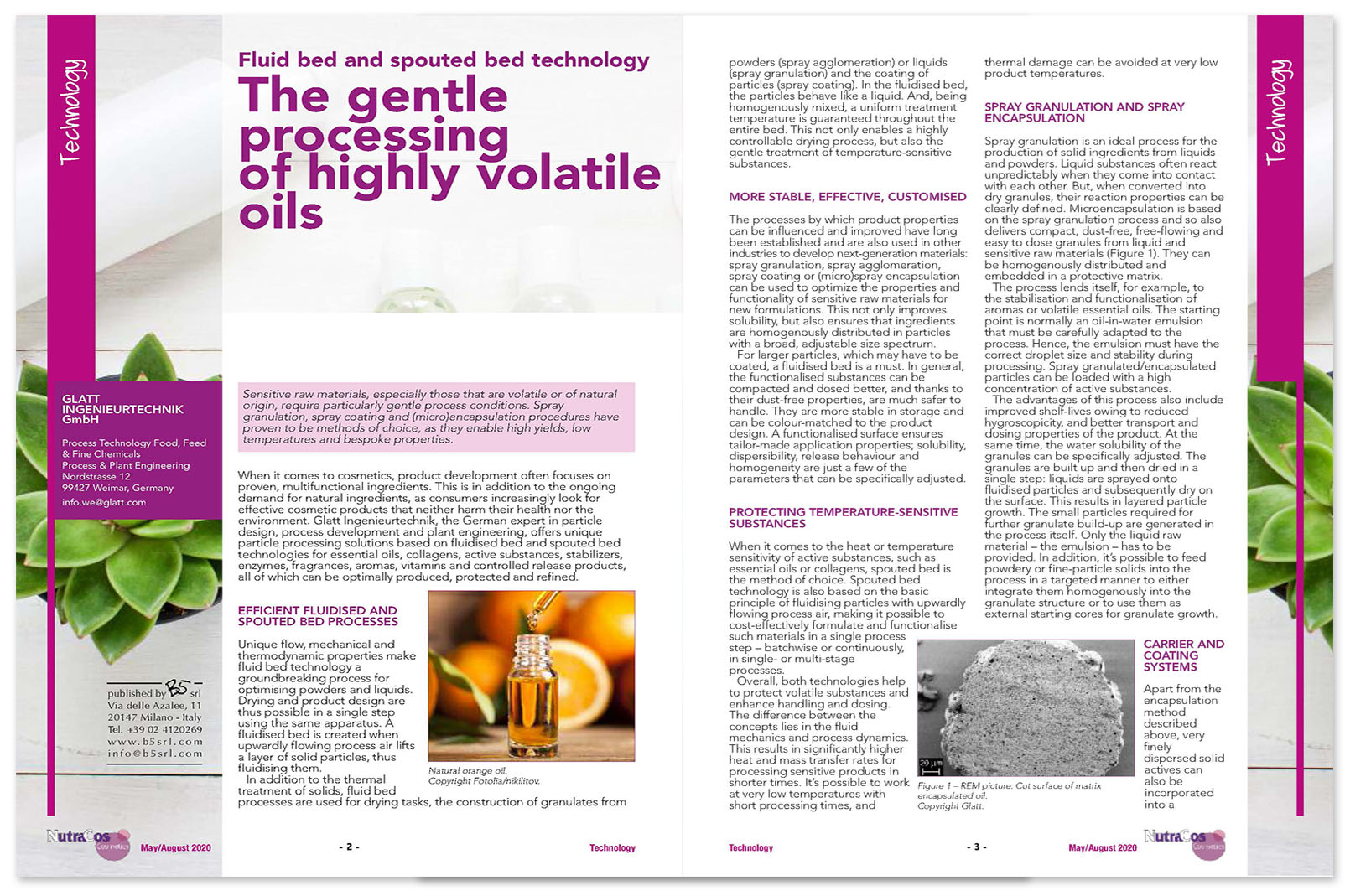Automatic control and regulation online in the fluid bed
The aim of the joint project was the realization of a measurement and control system for monitoring and controlling the pharmaceutical manufacturing step “fluid bed granulation” on a pilot granulator. The automatic monitoring and control of the granulation process was to be developed on the basis of the direct product properties, since the granulation process defines the basis for important characteristics of the subsequent pharmaceutical form (uniformity of the active ingredient content, or processability in tabletting). In the course of this, the influence of the data recorded today on the quality of the intermediate product produced was to be examined. In addition, new possible parameters for process control were to be found and analyzed online. These could be, for example, the particle size distribution in the granules or a surface characteristic of the particles.
At the end of the project, methods were to be developed that would make it possible to monitor and control critical (relevant) process parameters in fluid bed granulation. In principle, this was intended to establish improved process control of granulation processes in the fluidized bed. Improved granules are to be produced through the targeted influencing of property distributions in fluid bed granulation. The already high quality level in pharmaceutical production would be further increased with the consequence of producing fewer deviations, having to block fewer batches and thus also improving quality and drug safety for the end user as well as conserving natural resources.
Principle of artificial neural networks
Main objectives of the project:
- Identification of relevant parameters of the process or also of the granulate as control variables,
- Development of novel model-based algorithms for the prediction of process-relevant product parameters and parameter distributions from spatially and spectrally resolved product properties,
- Development of novel online sensor systems for spatially resolved quantification of process-relevant product parameters,
- Elaboration of the plant and control engineering fundamentals for the precise control of particle growth in granulation processes as well as testing on a laboratory scale,
- Validation of the new process on a fluid bed granulator at pilot scale,
- Ensuring regulatory feasibility.
Glatt Ingenieurtechnik focused on process modeling via artificial neural networks (KNN), which are then applied in the elaboration of the process control. This involved an extensive experimental test program on a laboratory apparatus in order to generate sufficient training data for modeling with KNN. Furthermore, the developed process control was scaled and validated on a pilot plant.
The subproject was divided into 12 work packages:
- Creation of a requirements profile
- Basic experiments, analytics and process analysis
- Experimental evaluation and process modeling
- Derivation of a control methodology
- Construction of a laboratory apparatus for basic experiments
- Development of adaptive, self-learning process models
- Development of model-based control of the granulation process
- Functional verification of the model-based control
- Research of technical solutions for process scaling
Regulation and control systems for fluid bed spray agglomeration – Control models for every granule
Fully automated processes require reliable process data. These are determined with methods of statistical experimental design and the application of artificial neural networks.
The presented case study has shown the potential as well as the general feasibility of a model-based control of a fluidized bed spray agglomeration process. In addition to the actual control task, the systematic approach allows a deeper insight into details of concrete industrial granulation processes. The process understanding gained in this way helps the respective users to gain insights into which additional possibilities exist for optimizing their granulation application. Nevertheless, close cooperation between the plant operator and the plant manufacturer is essential when designing a granulation plant. Only in this way can the full potential of the granulation process be exploited and the optimum solution developed for the user. Decades of experience in fluid bed granulation coupled with innovative plant and control concepts as well as process engineering solutions provide the right basis for this. (article in German language)
» Author: Dr.-Ing. Michael Jacob, Glatt Ingenieurtechnik GmbH
» originally published in the trade magazine ‘P&A Prozessdigitalisierung Automation’, issue 10/2018, publish-industry Verlag GmbH
Continuous monitoring and automatic control of pharmaceutical processes. Example: Fluid bed granulation (poster, German)
Project partners:
- Bayer Weimar GmbH und Co. KG
- Glatt Ingenieurtechnik GmbH
- Forschungszentrum für Medizintechnik und Biotechnologie (fzmb) GmbH
- Leibniz-Institut für Photonische Technologien e.V. (IPHT)
The project “ASTEROID-WS” is funded by the Free State of Thuringia within the framework of the joint project number 2016 FE 9052 and co-financed by funds of the European Union within the framework of the European Regional Development Fund (ERDF).
Funding period: 01.04.2017 – 31.03.2020
Further information on this topic and related topics can also be found in the following publications:
Published article: ‘Outsourcing – Trust in competent partners’ PDF, English
Published article: ‘How to Tame Recalcitrant Ingredients with Technological Processes’ PDF, English
Published article: ‘Spray agglomerating plant-based milk alternatives for optimised product properties’ PDF, English
Published article: ‘Optimisation of Functional Ingredients for Improved Nutrition by Fluidised Bed and Spouted Bed Technologies’ PDF, English
Published article: ‘The gentle processing of highly volatile oils by fluid bed and spouted bed technology’ PDF, English

